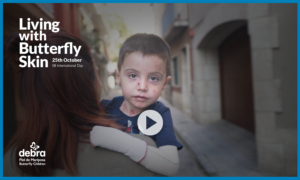- This organisation is the only support group for families with Butterfly Skin in Spain: a rare and incurable disease, which currently affects more than 500 people in Spain. It is characterised by the extreme fragility of the skin, leading to lifelong pain and disability.
- A short documentary and a series of videos published on social media portray the life of a 5 year old superhero with Butterfly Skin who faces and overcomes the very many obstacles and challenges of living with this condition every day.
- In a collection of personal testimonies from families and their support team they underline the sadness and frustration felt due to the lack of support they receive from the National Health Service and the shortage of funding for research.
- On International Butterfly Skin Day they are appealing for a public response to ensure that the charity can continue to offer medical and social support and to help with funding for the development of a cure.
DEBRA The Butterfly Children’s Charity launch “Living with Butterfly Skin”, a campaign that portrays the reality of living with Butterfly Skin for Adria: a 5 year old superhero from Cardedeu in Barcelona. He is kind, happy and fun and has Butterfly Skin: a rare and currently incurable disease.
“The protein that holds the skin together and protects it from damage, is simply not there. They have to be bandaged every day to protect the wounds caused by the lightest touch and painful woundcare treatments can take up to three hours a day” Said Evanina Morcillo Makow, Director of the charity. This is the reality of what life is like for little Adria. This campaign focuses on raising awareness so that in turn we the charity can continue to focus on improving the quality of life for families with Butterfly Skin.
Physical and psychological barriers
As well as the painful daily treatments, Butterfly Skin causes muscular and skeletal retractions and further complications of the condition include the eyes, mouth and the oesophagus. “Simple actions like eating, walking or giving someone a hug can be extremely painful” said Miriam Villa, specialist DEBRA nurse.
On an emotional level there are so many challenges to overcome. One of the first psychological impacts of the condition is the excitement and joy that comes with bringing a new baby into this world is quickly replaced with distress loneliness and fear” underlined Nora Garcia, DEBRA psychologist. “As it is a rare disease and affects a minority group, families and children often have to cope with questions and looks from people that can hurt more than the painful wounds”

Support networks
The documentary talks about the support network that Adria relies on for his day-to-day care. As well as the healthcare team from the Sant Joan de Deu hospital (reference centre for the disease) and other social workers, it underlines the work of DEBRA as the only national organisation that works to improve the quality of life for these families.
The charities specialist team of nurses, psychologists and social workers ensure that both National Health Service healthcare practitioners and families are supported from birth to end of life care. With the birth of a newborn baby the team are immediately dispatched to be with families at this incredibly distressing time. Their expertise in care and treatment is invaluable for medical staff and they offer support and information to families at this very difficult time.
Adria’s family underlined that in their case DEBRA was and is the light that guides them. We don’t know what we would do without them. They are our point of reference, when we have any doubts they are always there for us. They are without a doubt absolutely essential to our quality of life”


Lack of support from the National Health Service
Despite all of the support offered by DEBRA the charity says “this is not enough” They are fighting for more support from the public administration service and for more investment into research:
The public administration in Spain invests approximately, 1.2% of the GDP in research and we are a long way from the 2.3 % of other European countries. We need much greater investment so that families know that there is someone out there working towards finding a cure for this devastating disease” said Nuria Tarrats, researcher for DEBRA.
”We need a cure. We don’t only want to improve the quality of life for our son. We want him to be healed. We really need this and we are sure that one day it will happen”, concluded Adria’s father.
